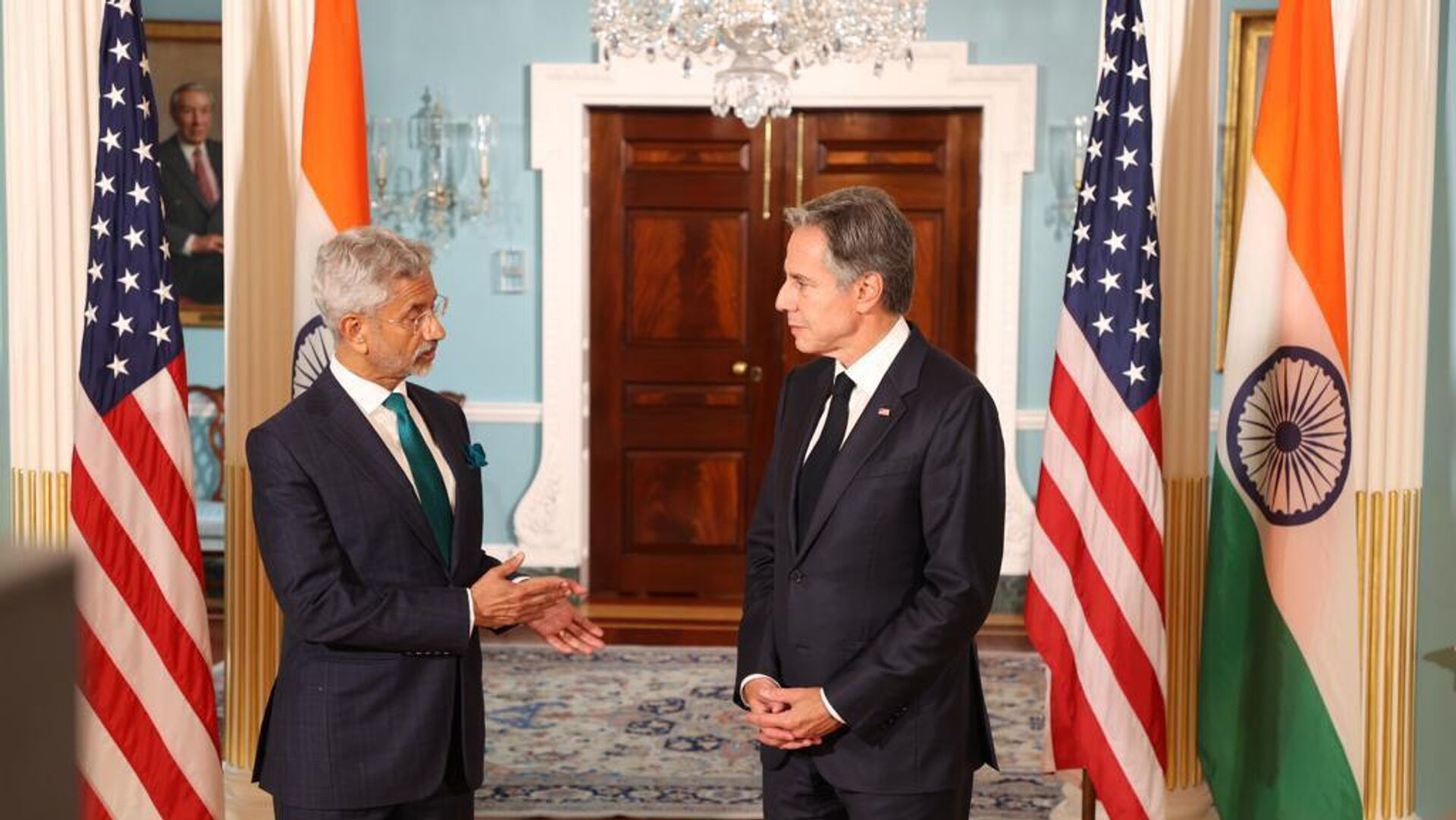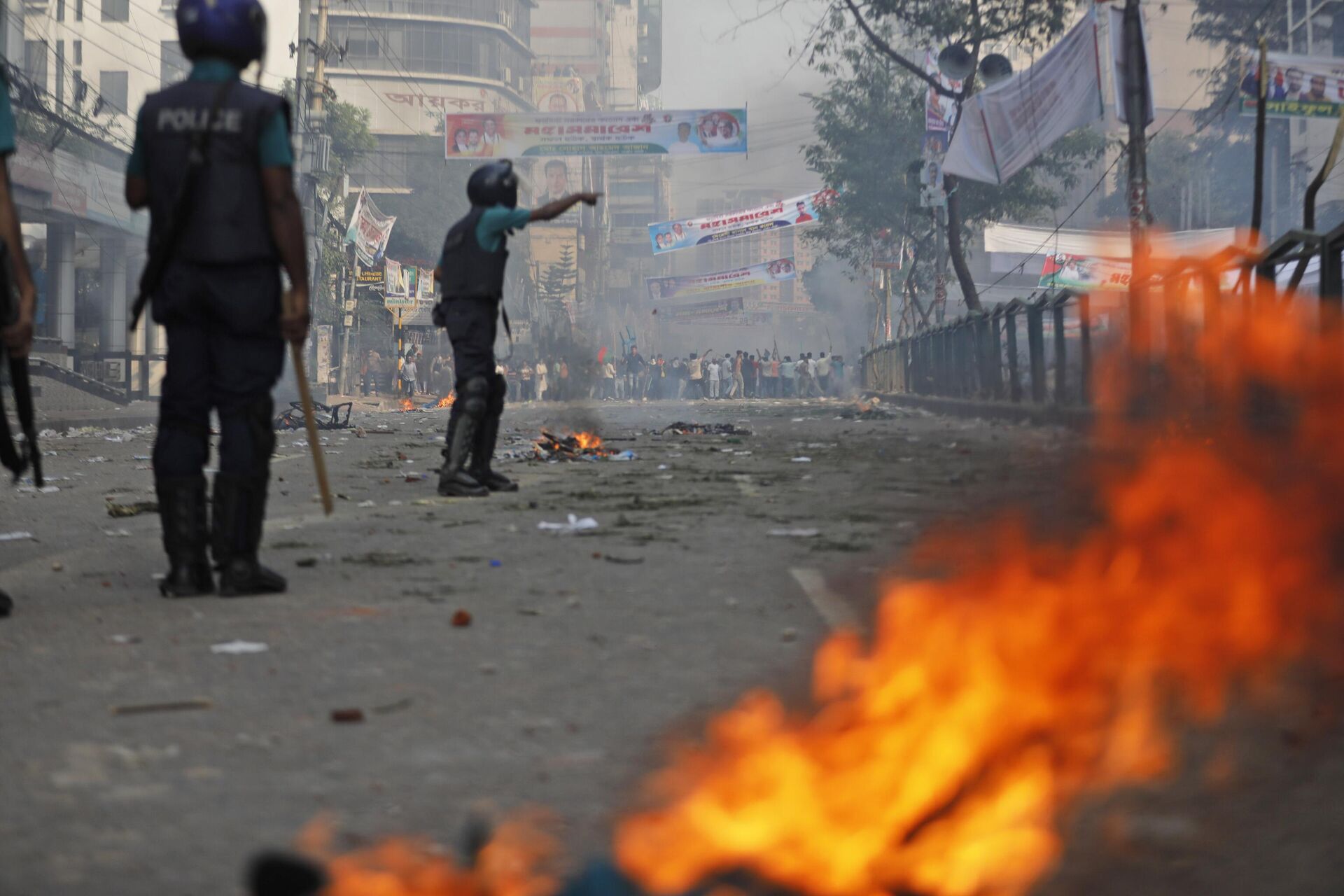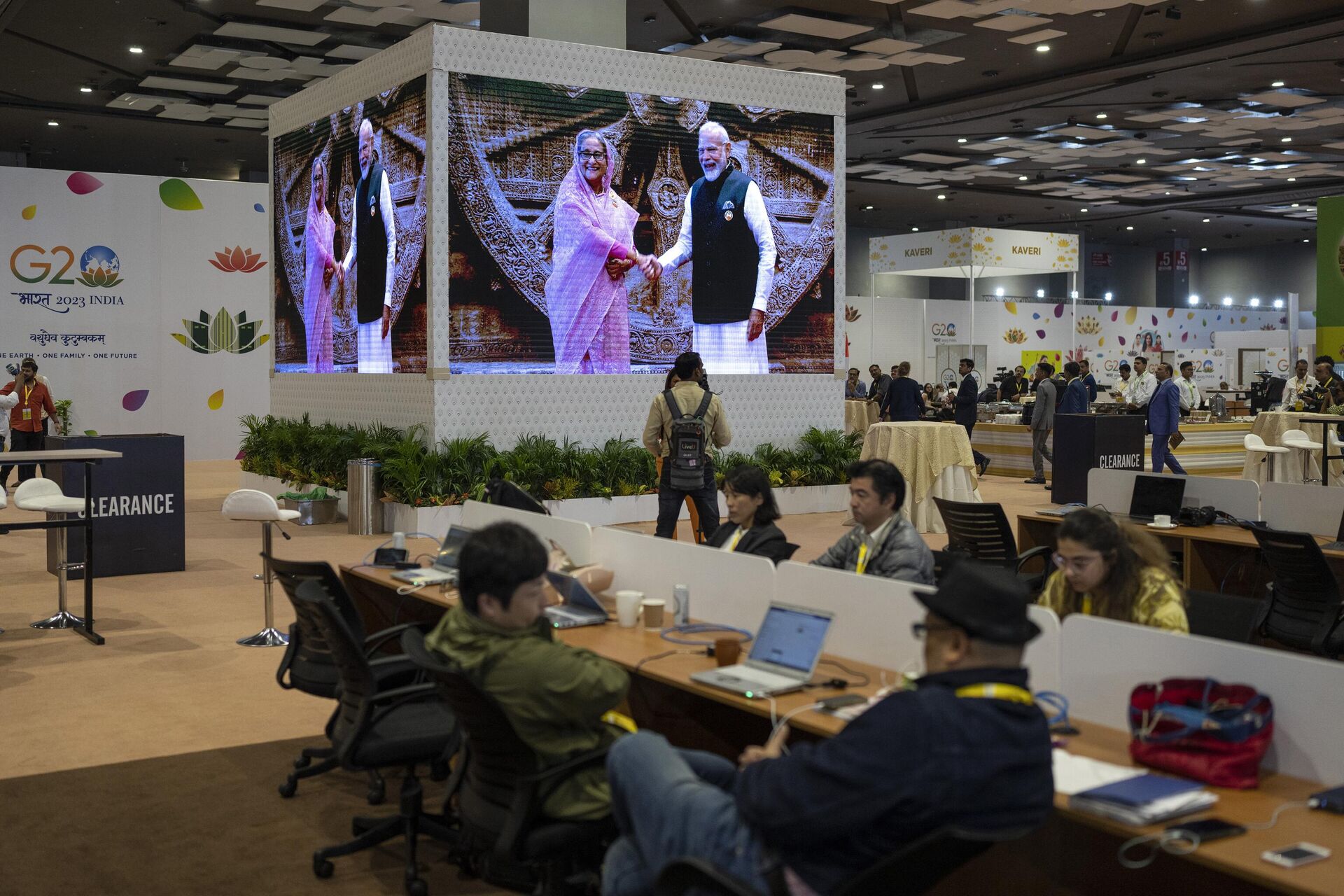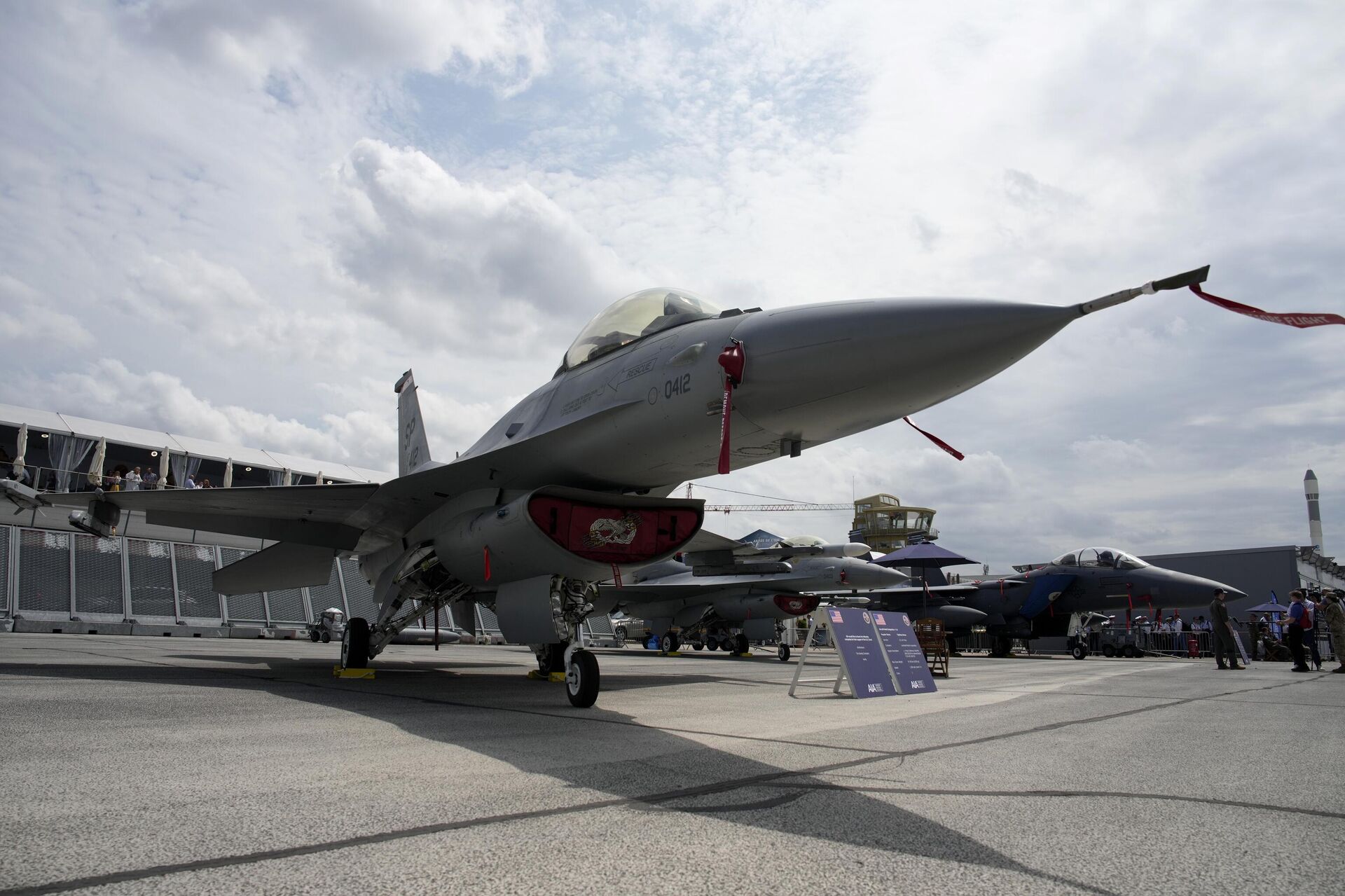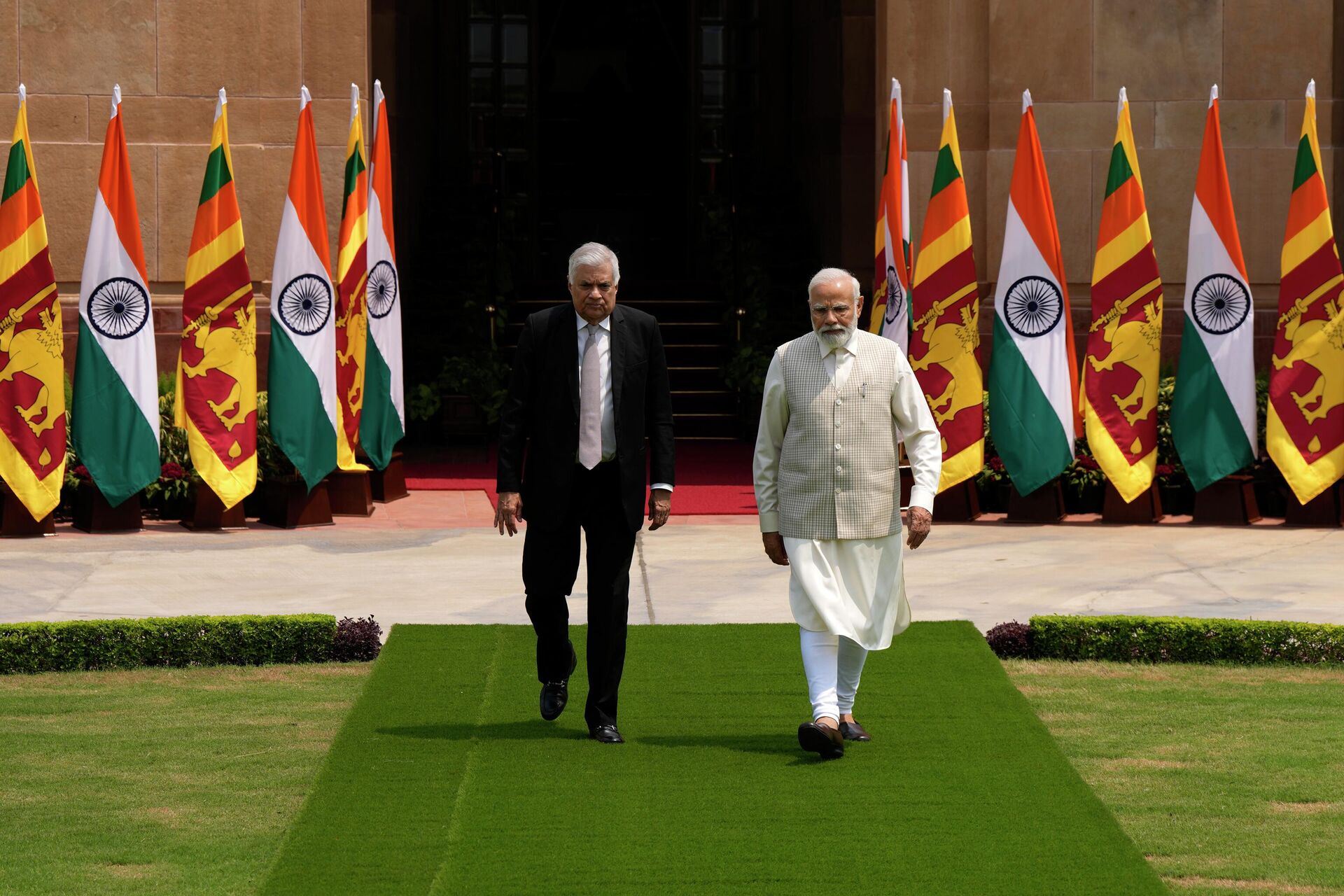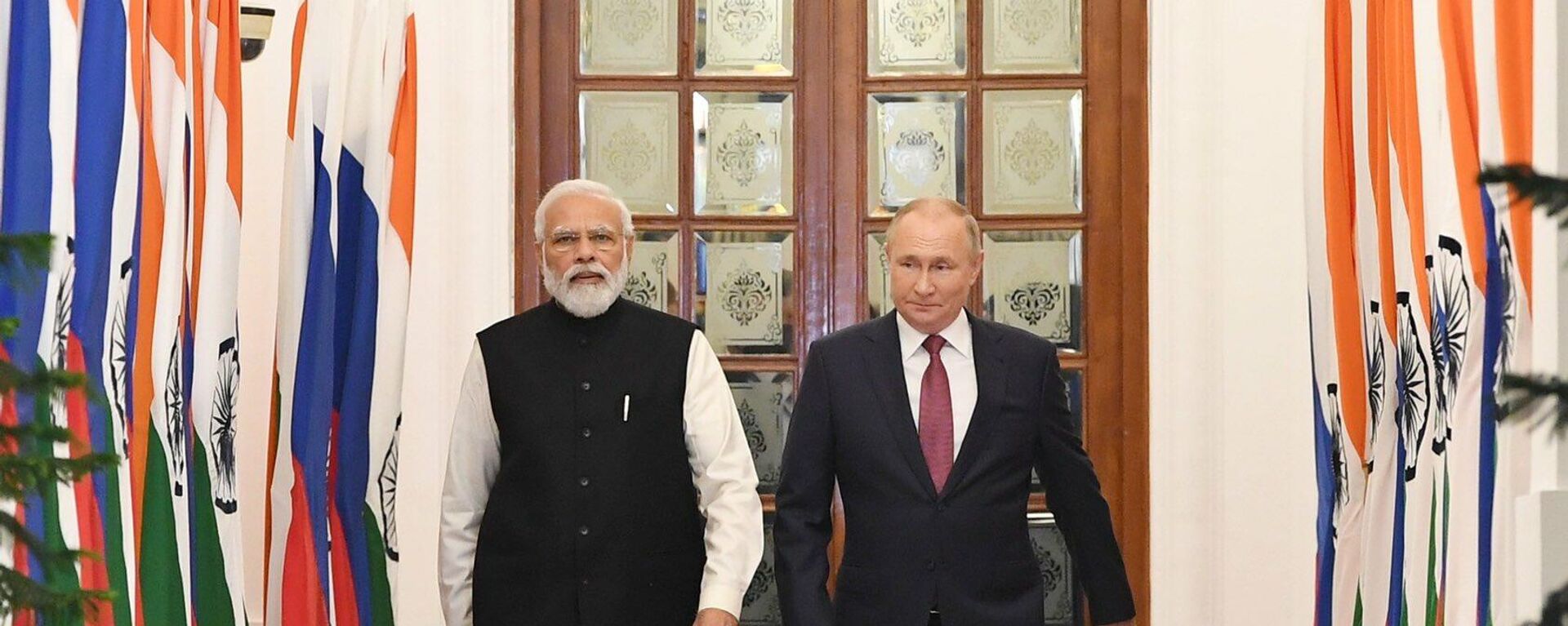https://sputniknews.in/20231129/india-should-closely-watch-us-assertiveness-in-south-asia-experts--5637412.html
India Should Closely Watch US Assertiveness in South Asia: Experts
India Should Closely Watch US Assertiveness in South Asia: Experts
Sputnik India
Prime Minister Narendra Modi has been seeking greater cooperation with the US in south Asia and the Indian Ocean Region (IOR), as New Delhi faces growing competition from Beijing in its immediate neighbourhood.
2023-11-29T20:47+0530
2023-11-29T20:47+0530
2023-11-30T13:54+0530
india
us
new delhi
joe biden
narendra modi
sheikh hasina
bangladesh nationalist party
ministry of external affairs (mea)
us navy
imf loan
https://cdn1.img.sputniknews.in/img/07e7/09/1d/4512810_0:0:1024:577_1920x0_80_0_0_02c606e5f7822b0de21e16ec07fd3a9e.jpg
Prime Minister Narendra Modi has been seeking greater cooperation with the US in south Asia and the Indian Ocean Region (IOR), as New Delhi faces growing competition from Beijing in its immediate neighbourhood.The joint statement released after the White House meeting between Modi and US President Joe Biden in June called for deepening cooperation between the two ‘comprehensive global strategic partners’ in India’s immediate periphery.The joint statement also noted that India had also emerged as a "hub" for maintenance and repair for "forward deployed US Navy assets", in another sign of growing cooperation.The US, for its part, has been relying on network of alliances and partners to contain China’s influence across Indo-Pacific, as stated in Biden’s National Security Strategy (NSS) unveiled last year.While the Biden administration’s calls for holding a free and fair election is being viewed as tacit support for the opposition Bangladesh Nationalist Party-Jamaat Islami (JI) alliance, New Delhi has struck a cautious tone on the developments in its eastern neighbour.While New Delhi has refused to comment on Dhaka’s internal affairs, the US ambassador has openly supported the protesters.N. Sathiya Moorthy, a Chennai-based policy analyst and commentator, told Sputnik India that New Delhi has always liked to take a “lead” in South Asia and IOR, which has traditionally been its sphere of influence.He said that India’s view of the region was “endorsed” by Moscow on most of the matters pertaining to regional security of other issues.He underscored that different priorities of India and the US stemmed from the fact that New Delhi was an “immediate neighbour” in South Asia.Why is US’ Stance on Bangladesh Inimical to Indian Interests?Squadron Leader (retired) Sadrul Ahmed Khan, a Member of Finance and Planning Affairs sub-committee of Bangladesh’s ruling Awami League, told Sputnik India that the “Islamist alliance” of BNP and JI doesn’t respect India’s sensitivities as the Hasina government had done since it returned to power in 2009.He recalled that New Delhi harboured deep-rooted security anxieties about former Prime Minister and BNP head Khaleda Zia’s support to insurgents in northeast India, which adjoins Bangladesh.Moorthy recalled that New Delhi and Washington have always had “divergences” on Bangladesh.The Indian expert noted that US’ measures had been seen as targeting the Awami League government.During Bangladesh’s War of Liberation in 1971, New Delhi and Washington found themselves on the opposing sides as then-American President Richard Nixon backed Pakistan by dispatching US Navy’s Seventh Fleet aircraft carrier to Bay of Bengal to help Islamabad crush the independence movement.The American move was pre-emptively thwarted by the forward posturing of Russian Navy’s Pacific Fleet warships after New Delhi and Moscow signed a mutual defence treatyUS Military Assistance to Pakistan Needs to Be Watched by IndiaPakistan is another South Asian nation where Indian and American policy-makers have hardly looked eye-to-eye.A Cold War treaty ally of the US, Pakistan was designated as a “major non-NATO partner” of Washington during the ‘War on Terror’. On the other hand, India has maintained all along (to this day) that Pakistan has been supporting cross-border terrorism against Indian interests.While relations between India and the US have been on upswing since India was designated as a “major defence partner” in 2016 and the Quad grouping was re-invigorated in 2018, differences over Pakistan have continued to persist.For instance, India protested against Biden administration’s decision last year to resume military aid to Islamabad, as the US State Department approved a $450 million Foreign Military Sale (FMS) for the upkeep of Pakistan Air Force’s (PAF) F-16 fighter jet fleet.Indian foreign minister S. Jaishankar slammed the transaction, warning that the American jets would end up being deployed against India.Moorthy noted that the US had finally managed to “de-hyphenate the India-Pakistan relationship”.Moorthy reckoned that the US would continue to engage with Pakistan as part of its policy towards Afghanistan.Strategic Interests of India & Sri Lanka are IntertwinedMoorthy said that there were concerns around American influence in Sri Lanka.He noted that the revised Status of Forces Agreement (SOFA) between Washington and Colombo couldn’t be cleared in 2019 due to sovereignty concerns in Sri Lanka.According to reports, the pact would have given additional immunity to American troops visiting Sri Lanka and even done away with the need for visas for visiting US military personnel.The US realizes the strategic significance of Sri Lanka in its ongoing geopolitical rivalry with Beijing.According to US estimates, more than 60,000 ships, including two-thirds of the world’s seaborne crude oil and half of its container ships, transit the Sri Lankan waters.“We believe that the security interests and development of India and Sri Lanka are intertwined. And therefore, it is essential that we work together keeping in mind each other's safety and sensitivities,” Modi told Wickremesinghe during the summit in New Delhi in July.In fact, New Delhi emerged as the largest aid donor to Sri Lanka in the wake of economic crisis which hit the nation in 2021. India has also taken a lead in negotiating the restructuring of Sri Lanka’s foreign debt with major western donors.*under UN sanctions
https://sputniknews.in/20231127/russias-resurgence-welcomed-in-indias-neighbourhood-amid-us-pressure-5603984.html
india
us
new delhi
bangladesh
pakistan
afghanistan
indo-pacific
china
bay of bengal
south asia
indian ocean
Sputnik India
feedback.hindi@sputniknews.com
+74956456601
MIA „Rossiya Segodnya“
2023
Dhairya Maheshwari
https://cdn1.img.sputniknews.in/img/07e6/0c/13/138962_0:0:641:640_100x100_80_0_0_2cb44360dbcdf6d84bf4b299cd045917.jpg
Dhairya Maheshwari
https://cdn1.img.sputniknews.in/img/07e6/0c/13/138962_0:0:641:640_100x100_80_0_0_2cb44360dbcdf6d84bf4b299cd045917.jpg
News
en_IN
Sputnik India
feedback.hindi@sputniknews.com
+74956456601
MIA „Rossiya Segodnya“
Sputnik India
feedback.hindi@sputniknews.com
+74956456601
MIA „Rossiya Segodnya“
Dhairya Maheshwari
https://cdn1.img.sputniknews.in/img/07e6/0c/13/138962_0:0:641:640_100x100_80_0_0_2cb44360dbcdf6d84bf4b299cd045917.jpg
india us relations, india us news, modi biden summit, modi news, south asia, indian ocean, bangladesh elections, us bangladesh visa policy, us bangladesh relations, india us trade, sri lanka china debt trap, sri lanka china relations, sri lanka china ship, sri lanka imf loan, sri lanka economic crisis, us pakistan deal, us pakistan relations, india china relations, india china news, india china border, ladakh standoff, indo pacific, us china war,
india us relations, india us news, modi biden summit, modi news, south asia, indian ocean, bangladesh elections, us bangladesh visa policy, us bangladesh relations, india us trade, sri lanka china debt trap, sri lanka china relations, sri lanka china ship, sri lanka imf loan, sri lanka economic crisis, us pakistan deal, us pakistan relations, india china relations, india china news, india china border, ladakh standoff, indo pacific, us china war,
India Should Closely Watch US Assertiveness in South Asia: Experts
20:47 29.11.2023 (Updated: 13:54 30.11.2023) The growing American assertiveness in south Asia risks relegating New Delhi to play a secondary role in the region. Traditionally, New Delhi has been the dominant regional power in south Asia.
Prime Minister Narendra Modi has been seeking greater cooperation with the US in south Asia and the Indian Ocean Region (IOR), as New Delhi faces growing competition from Beijing in its immediate neighbourhood.
The joint statement released after the White House meeting between Modi and
US President Joe Biden in June called for deepening cooperation between the two ‘comprehensive global strategic partners’ in India’s immediate periphery.
The joint statement also noted that India had also emerged as a
"hub" for maintenance and repair for "forward deployed
US Navy assets", in another sign of growing cooperation.
The US, for its part, has been relying on network of alliances and partners to contain
China’s influence across
Indo-Pacific, as stated in Biden’s
National Security Strategy (NSS) unveiled last year.
However, divergences between India and the US on their respective outlook towards Bangladesh, have put a spotlight on differing priorities for the region. Significantly, Prime Minister Modi's foreign policy priortises India's neighbourhood over other regions.
While the Biden administration’s calls for holding a free and fair election is being viewed as
tacit support for the opposition Bangladesh Nationalist Party-Jamaat Islami (JI) alliance, New Delhi has struck a cautious tone on the developments in its eastern neighbour.
While New Delhi has refused to comment on
Dhaka’s internal affairs, the US ambassador has openly supported the protesters.
“India will continue to support Bangladesh’s vision of a stable, peaceful and a progressive nation,” India’s Ministry of External Affairs (MEA) spokesperson Arindam Bagchi told a regular briefing this month.
N. Sathiya Moorthy, a
Chennai-based policy analyst and commentator, told Sputnik India that New Delhi has always liked to take a “lead” in South Asia and IOR, which has traditionally been its sphere of influence.
“During the Cold War era, which was marked by cooperation between New Delhi and Moscow, India took the lead in matters pertaining to South Asia, be it the Kashmir dispute or Bangladesh,” Moorthy explained.
He said that India’s view of the region was “endorsed” by Moscow on most of the matters pertaining to regional security of other issues.
“However, that hasn’t been the case in India-US relations since the two sides signed the 10-year defence framework agreement in 2005. One can’t expect the same level of comfort to develop between India and the US as used to be case between New Delhi and Moscow. It is not happening anytime soon,” reckoned Moorthy.
He underscored that different priorities of India and the US stemmed from the fact that New Delhi was an “immediate neighbour” in South Asia.
“So, the concerns and compulsions of both the countries are not necessarily the same,” added Moorthy.
Why is US’ Stance on Bangladesh Inimical to Indian Interests?
Squadron Leader (retired) Sadrul Ahmed Khan, a Member of Finance and Planning Affairs sub-committee of Bangladesh’s ruling Awami League, told Sputnik India that the “Islamist alliance” of BNP and JI doesn’t respect India’s sensitivities as the
Hasina government had done since it returned to power in 2009.
“The BNP and its Islamist allies favoured closer cooperation with Pakistan, unlike the Hasina government. The US, through its support of BNP, seeks to destabilize the region,” Khan claimed.
He recalled that New Delhi harboured deep-rooted security anxieties about former Prime Minister and BNP head Khaleda Zia’s support to insurgents in northeast India, which adjoins Bangladesh.
Moorthy recalled that New Delhi and Washington have always had “divergences” on Bangladesh.
“In the case of Bangladesh, the views of India and the US have remained divergent over the last 15 to 20 years. The US need to clarify its position on Bangladesh for the sake of overall cooperation with India in the South Asian region,” stressed Moorthy.
The Indian expert noted that US’ measures had been seen as targeting the Awami League government.
During Bangladesh’s War of Liberation in 1971, New Delhi and Washington found themselves on the opposing sides as then-American President Richard Nixon backed Pakistan by dispatching US Navy’s Seventh Fleet aircraft carrier to
Bay of Bengal to help
Islamabad crush the independence movement.
The American move was
pre-emptively thwarted by the forward posturing of Russian Navy’s Pacific Fleet warships after New Delhi and Moscow signed a mutual defence treaty
US Military Assistance to Pakistan Needs to Be Watched by India
Pakistan is another South Asian nation where Indian and American policy-makers have hardly looked eye-to-eye.
A Cold War treaty ally of the US, Pakistan was designated as a “major non-NATO partner” of Washington during the ‘War on Terror’. On the other hand, India has maintained all along (to this day) that Pakistan has been supporting cross-border terrorism against Indian interests.
While relations between India and the US have been on upswing since India was designated as a “major defence partner” in 2016 and the Quad grouping was re-invigorated in 2018, differences over Pakistan have continued to persist.
For instance, India protested against Biden administration’s decision last year to resume military aid to Islamabad, as
the US State Department approved a $450 million Foreign Military Sale (FMS) for the upkeep of Pakistan Air Force’s (PAF) F-16 fighter jet fleet.
Indian foreign minister S. Jaishankar slammed the transaction, warning that the American jets would end up being deployed against India.
Moorthy noted that the US had finally managed to “de-hyphenate the India-Pakistan relationship”.
“In the last 10 to 15 years, Washington’s ties with both the nations have been viewed as standalone relationships, which wasn’t the case in the 1990s or during the Cold War,” he asserted.
Moorthy reckoned that the US would continue to engage with Pakistan as part of its policy towards
Afghanistan.
“In the present-day context after the Taliban* takeover, we will have to wait and watch as to if the US policy of arming Pakistan would continue,” added Moorthy.
Strategic Interests of India & Sri Lanka are Intertwined
Moorthy said that there were concerns around American influence in
Sri Lanka.
He noted that the revised Status of Forces Agreement (SOFA) between Washington and Colombo couldn’t be cleared in 2019 due to sovereignty concerns in Sri Lanka.
According to reports, the pact would have given additional immunity to American troops visiting Sri Lanka and even done away with the need for visas for visiting US military personnel.
“Even the current President Ranil Wickremesinghe, who is seen as pro-market and relatively more pro-West than his predecessors, will have hiccups in going beyond a certain point as far as developing closer strategic ties with the US are concerned,” Moorthy reckoned.
The US realizes the strategic significance of Sri Lanka in its ongoing geopolitical rivalry with Beijing.
According to US estimates, more than 60,000 ships, including two-thirds of the world’s seaborne crude oil and half of its container ships, transit the Sri Lankan waters.
Moorthy remarked that the US measured its relationship with Sri Lanka in terms of “trilateral dynamic which also involves China”.
On the other hand, India has been consistent in its position that its security interests are “intertwined” with Sri Lanka’s.
“We believe that the security interests and development of India and Sri Lanka are intertwined. And therefore, it is essential that we work together keeping in mind each other's safety and sensitivities,” Modi told Wickremesinghe during the summit in New Delhi in July.
In fact, New Delhi emerged as the largest aid donor to Sri Lanka in the wake of economic crisis which hit the nation in 2021. India has also taken a lead in negotiating the restructuring of Sri Lanka’s foreign debt with major western donors.
